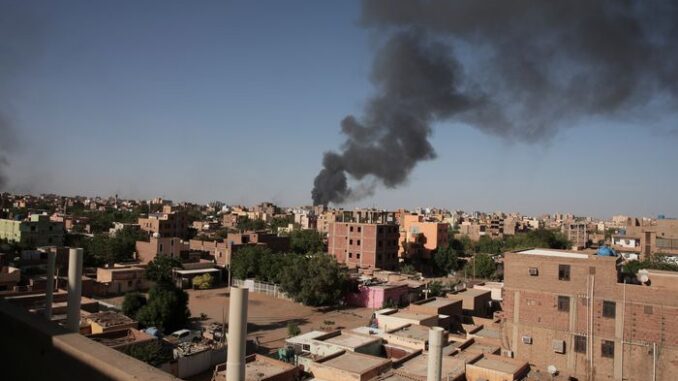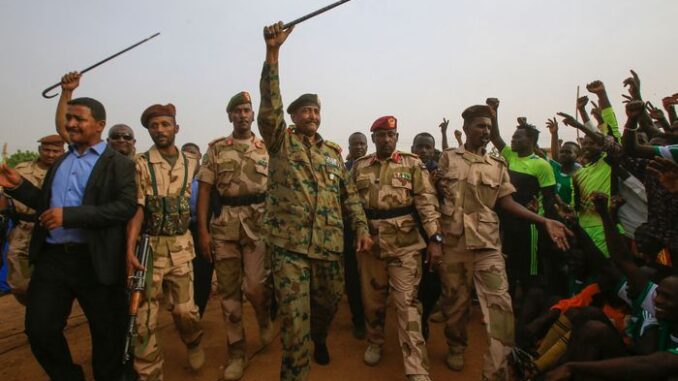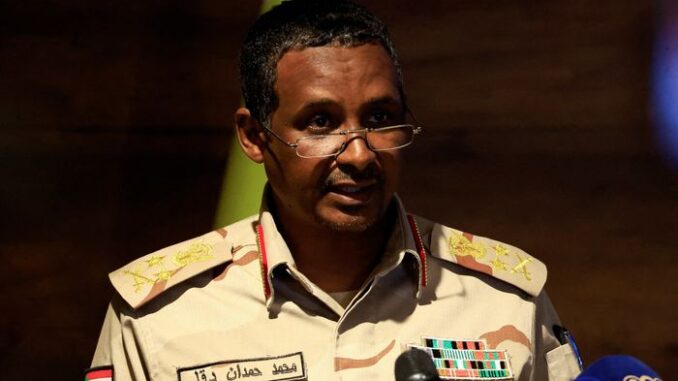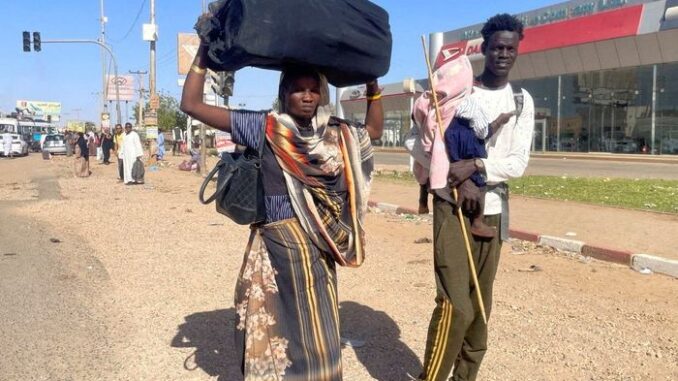T. Belman, Gen Burnham, the current leader of Sudan participated in the normalization agreement with Israel. The opposition was against it. So the fate of this power struggle has implications for Israel. Burnham paid $335 million in reparations to the US for “for victims of the bombings of the American embassies in Kenya and Tanzania in 1998 and the USS Cole in 2000,”
Some suggest that the CIA is involved with the destabilization.
A power struggle between generals has killed hundreds and trapped millions
By Nicholas Bariyo and Gabriele Steinhauser, WSJ April 29, 2023

Smoke rose over Khartoum as rival forces battled in Sudan’s capital in mid-April. PHOTO: MARWAN ALI/ASSOCIATED PRESS
A rivalry between Sudan’s top two generals erupted into warfare on April 15, pitting the East African country’s military against a state-sponsored militia called the Rapid Support Forces. The military is using jet fighters to strike RSF positions, many in densely populated areas, while both factions are engaging in street battles using guns and artillery fire. Tens of thousands of Sudanese have fled their homes, while millions are trapped in the capital Khartoum and elsewhere with diminishing supplies of food and water.
Why is there fighting in Sudan?
Lt. Gen. Abdel Fattah al-Burhan, the commander of the military, and Lt. Gen. Mohamed Hamdan Dagalo, who leads the RSF, joined forces in 2019 to oust Sudan’s longtime dictator, Omar al-Bashir, following months of popular protests. Two years later, they toppled a civilian transitional government that was meant to lead the country toward democratic elections.
As pressure from the United Nations, the U.S. and others grew in recent months to hand power back to civilian leaders, the two generals began jostling over who would ultimately control Sudan’s armed forces and companies stretching from agriculture to banking and mining that are owned by the military, the RSF and Gen. Dagalo’s family.

Lt. Gen. Abdel Fattah al-Burhan greeted supporters in 2019 after the ouster of Sudan’s dictator. PHOTO: ASHRAF SHAZLY/AGENCE FRANCE-PRESSE/GETTY IMAGES
Who are the two generals?
Gen. Burhan is the commander of Sudan’s military and de facto head of state since the 2021 coup. He graduated from the Sudanese Military College and received further military training in Egypt, before rising through the ranks of the armed forces under Mr. Bashir.
Gen. Dagalo, better known by his nickname, Hemedti, grew up in Sudan’s impoverished Darfur region. A former camel trader, he joined and soon became the leader of the infamous Janjaweed militia. After leading the Janjaweed on a brutal campaign against a local rebellion, he leveraged his ties to Mr. Bashir to build his militia into a state-sponsored private army that, by some estimates, counts as many as 70,000 fighters.
Gen. Dagalo is considered one of the richest men in Sudan, thanks to a range of businesses, including gold mining and hiring out his RSF troops to fight in other regional conflicts, such as in Yemen and Libya.

Lt. Gen. Mohamed Hamdan Dagalo addressed the media at his headquarters in Khartoum, Sudan, in February. PHOTO: MOHAMED NURELDIN ABDALLAH/REUTERS
How many deaths have there been since the fighting began?
At least 499 people have been killed and 4,741 injured in the fighting since April 15, according to figures provided by Sudanese health authorities to the World Health Organization. WHO officials have said that the real toll is much higher since only a minority of hospitals are able to report figures. The street battles and airstrikes have led to the collapse of Sudan’s healthcare system. Relatives of victims and emergency services have struggled to recover the bodies of people caught in the crossfire.
What is at stake?
The conflict has dashed hopes for a transition to democracy, a demand that thousands of Sudanese have voiced in regular street protests that started before Mr. Bashir’s 2019 ouster.
Beyond the immediate loss of human lives, the fighting has also damaged infrastructure, including the health system, airports, bridges and roads in a country that is already among the poorest in the world. Around a third of Sudan’s more than 45 million people suffered hunger before the fighting began, the result of regional conflicts and a protracted economic crisis.
Most humanitarian agencies, including those providing food and medical aid, have been forced to stop their services because of the continued violence.
What other countries have an interest in Sudan?
Sudan sits at the crossroads between the Middle East and sub-Saharan Africa. Countries including Russia, the United Arab Emirates and Turkey have eyed Sudan’s Red Sea coasts for ports and naval bases that would give them access to one of the world’s busiest shipping lanes. Sudan’s northern neighbor, Egypt, wants Khartoum’s support to stop a dam being built further south on the Nile River. Cairo fears the dam will choke off freshwater for some 100 million Egyptians and cripple its agriculture industry.
The U.A.E. and Saudi Arabia have invested billions of dollars in Sudan, including buying up farmlands irrigated by the Nile. The U.S. is worried about Russia’s influence in Sudan, including lucrative gold mining carried out by companies controlled by Yevgeny Prigozhin, an ally of Russian President Vladimir Putin.
Mr. Prigozhin’s Wagner group has offered heavy weapons to the RSF, the militia run by Gen. Dagalo, The Wall Street Journal has reported. A person close to the general said he has declined the offer for now.
Gen. Dagalo’s rival, Gen. Burhan, meanwhile, has received support from neighboring Egypt, the Journal has also reported.

People fled clashes in the Sudanese capital in mid-April. PHOTO: EL TAYEB SIDDIG/REUTERS
Are Americans affected by the fighting?
Over the weekend, American commandos successfully retrieved just under 100 U.S. Embassy personnel, Marine Corps guards and allied diplomats from Khartoum, according to Biden administration officials. Officials estimate that some 16,000 other U.S. citizens remain in Sudan, many of them dual nationals.
Biden administration officials have said they are trying to help other U.S. citizens who are attempting to leave the country. “We have deployed U.S. intelligence, surveillance and reconnaissance assets to support land evacuation routes, which Americans are using, and we’re moving naval assets within the region to provide support,” national security adviser Jake Sullivan said.
An uncounted number of Americans have made their way by road to Port Sudan, either hoping to catch evacuation flights provided by other governments or ferries leaving for Jeddah, Saudi Arabia. Others are trying to get to other neighboring countries such as Egypt or Ethiopia.
The State Department said Americans and legal permanent residents who have fled safely are in the hundreds.
On April 29, the State Department said a U.S. government-organized convoy carrying U.S. citizens, locally employed staff, and nationals from allied and partner countries arrived at Port Sudan. Those who are eligible will be assisted to travel to Jeddah, where additional U.S. personnel are positioned to help with consular and emergency services, State Department spokesman Matthew Miller said.
“The U.S. government has taken extensive efforts to contact U.S. citizens in Sudan and enable the departure of those who wished to leave,” he said.
The U.S. has repeatedly advised Americans against travel to Sudan due to the civil unrest and is urging Americans still there to review departure options on the State Department’s website.
Is there a cease-fire?
The military and the RSF late Thursday agreed to extend an earlier, only partially observed, cease-fire by another three days, according to an announcement from the African Union, the U.N., the U.S. and other governments that have been urging the two generals to negotiate an end to the conflict. Friday morning, however, the RSF, in a statement from its Twitter account, already accused the military of breaking the truce, suggesting the latest cease-fire was also unlikely to hold. There was no immediate response from the military.
Residents in Khartoum said they continued to hear sounds of gunfire and artillery, albeit at a lower intensity. A doctor at Al-Nada Hospital, one of the few functioning clinics in Omdurman, Khartoum’s twin city across the Nile, said he could hear loud explosions from airstrikes and antiaircraft guns. Human-right activists in West Darfur, near Sudan’s border with Chad, said Arab militias linked to the RSF were taking advantage of the chaos unleashed by the war and attacking non-Arab civilians in towns and villages. The U.N. said markets and several humanitarian organizations’ premises have been looted around Ag Geneina town over the past three days.
Thousands of Sudanese, as well as South Sudanese refugees who had previously fled into Sudan, have now sought refuge in Chad and South Sudan, overwhelming communities that were already struggling with local conflicts and lack of food, water and other basic resources.
This article may be periodically updated.
—Gordon Lubold, Vivian Salama and Ben Kesling contributed to this article.
Write to Nicholas Bariyo at nicholas.bariyo@wsj.com and Gabriele Steinhauser at Gabriele.Steinhauser@wsj.com



First-hand report:
https://www.aljazeera.com/news/2023/4/29/sudanese-stuck-as-passports-locked-in-abandoned-western-embassies
A good short list. This is sort of a goulash of what’s currently happening in Ukraine, Syria, Lybia and Yemen. As for the Wagner group, this confirms what their leader, Prigozhin, has been saying lately: He’s tired of squabbling with other Russian bigwigs while he throws tens of thousands of unfortunate Russians into the Bakhmut meatgrinder.
Biden used the WAR POWERS ACT to insert American troops into a Vietnam-style, long-term commitment to war in the Sudan.
Interesting, how these events, with Iran thrown into the mix, completely surround Israel Ezekiel 38-39. According to the Bible, the US & NATO sit this one out — but not for long. Vaya con Dios, Israel!